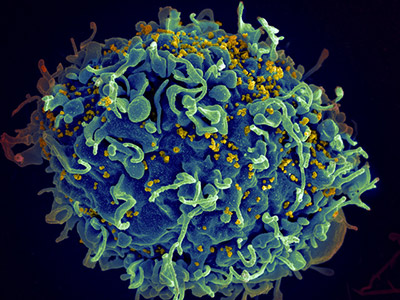SA Gov urged to embrace groundbreaking new global HIV strategies

HIV particles infecting a human T cell (Image: NIH)
In a major change in policy, the World Health Organisation (WHO) has recommended that people who test positive for HIV should start taking antiretroviral (ARV) medication immediately.
“Anyone infected with HIV should begin antiretroviral treatment as soon after diagnosis as possible” no matter their age or populations groups, WHO said on Wednesday.
It’s new “treat-all” or “test and treat” recommendation is supported by recent findings from clinical trials confirming that early use of ARV keeps people living with HIV alive, healthier and reduces the risk of transmitting the virus to partners.
Previously, only HIV positive people whose immune systems had a certain reduced level of CD4 cells were urged to start treatment.
The Anova Health Institute, which recently made news with the launch of its groundbreaking We The Brave campaign targeting MSM, applauded WHO’s new guidelines.
“This recommendation is likely to have major implications for our fight against HIV. Early treatment will keep HIV positive individuals healthy, but also, will decrease their potential to transmit virus to others,” explained Professor James McIntyre, CEO of the Anova Health Institute.
He acknowledged the challenges that a “test and treat” ARV strategy brings to South Africa, which has the largest state funded HIV treatment programme in the world, reaching around three million people.
“Despite these significant challenges, the time to act is now. If we are serious about ending the epidemic in South Africa, we need to move towards implementing all evidence based tools at our disposal,” said McIntyre.
He encouraged the South African government to consider revising its HIV treatment strategy to align with the WHO guidelines as soon as possible, insisting that doing so will save lives.
In its updated policy, WHO has also now recommended that all people at “substantial” risk of HIV should be offered preventive ARV treatment, known as PrEP. This follows the organisation’s 2014 call to offer PrEP to men who have sex with men (MSM).
Anova’s Dr Kevin Rebe, an infectious diseases specialist, commented that the new guidelines confirmed the effectiveness of PrEP. “The evidence for using PrEP in men who have sex with men is very strong and there is no longer any question about its ability to prevent HIV,” he said.
McIntyre also urged the South African government to work towards including PrEP in its HIV response policy as soon as possible.
Anova has been working towards implementing PrEP for MSM and will be launching a PrEP project at its Cape Town and Gauteng clinics. This project is funded by the Elton John Aids Foundation and will provide PrEP to 300 MSM attending state sector clinics for HIV care.
“We expect that lessons learned from this project will provide a roadmap for the Department of Health to scale up nurse-driven PrEP in state-sector clinics across the country,” said Ben Brown, a public health specialist from Anova.
“The new guidelines from the WHO provide a new paradigm in our comprehensive response to HIV. These effective interventions must be included in South Africa’s response and should be scaled up as soon as is feasible,” added McIntyre.
Based on the new recommendations, the number of people eligible for ARV treatment globally increases from 28 million to all 37 million people who currently live with HIV globally. According to UNAIDS estimates, expanding ART to all people living with HIV and expanding prevention choices can help avert 21 million AIDS-related deaths and 28 million new infections by 2030.
Leave a Reply